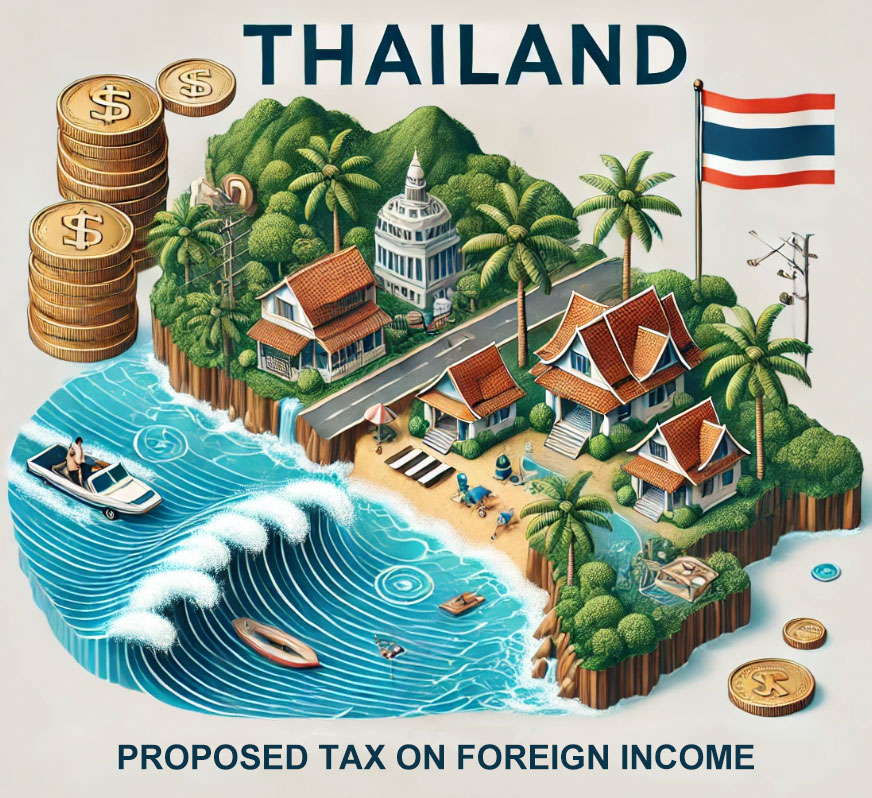In this article, we will explore Thailand’s proposed changes to its tax laws, which may require individuals residing in Thailand for over 180 days to pay tax on foreign income, even if that income is not brought into the country. While the draft law is still in the early stages, we will focus on its likely impact on the real estate market, particularly in Phuket—a popular resort destination for foreign investment and expat living.
Recent Tax Law Changes for Foreign Income
Before discussing the new proposal, it’s important to note that significant changes to Thailand’s foreign income tax laws have already taken effect. As of January 1, 2024, foreign income brought into Thailand is taxed in the year it is remitted, regardless of when the income was originally earned. This marked a shift from the previous rule, where foreign income was only taxed if it was brought into Thailand in the same calendar year it was earned. The elimination of this deferral strategy has already had an impact on how foreign income is treated for tax purposes, but the proposed law takes this one step further.
Overview of the Proposed Tax on Foreign Income
The Thai Revenue Department is currently drafting a law that would tax the income of individuals residing in Thailand that originates from overseas, regardless of whether that income is remitted into the country (source Bangkok Post). The proposal applies to individuals who reside in Thailand for more than 180 days per year. This follows the international principle of worldwide income taxation under the residence rule, meaning residents of Thailand could be taxed on income earned anywhere in the world, not just on income brought into Thailand.
The draft law would amend Section 41 of the Revenue Code and is focused specifically on personal income tax. Corporate income tax and income from mutual funds investing abroad (except for private funds) are not part of the current proposal.
Impact on Foreign Real Estate Investors
A majority of overseas buyers in Phuket purchase property as holiday homes or for investment purposes, and they typically do not reside in Thailand for more than 180 days per year. Since the proposed tax law would only apply to individuals who stay in the country for more than 180 days, these investors would fall outside the scope of this taxation. As a result, the majority of foreign buyers in Phuket would not be impacted by the new tax obligations.
For those foreign investors who do plan to live in Thailand for extended periods, many hold Long-Term Resident (LTR) visas. These visas, specifically designed to attract high-net-worth individuals, offer favourable tax benefits. While the full details of the new law are yet to be confirmed, it is highly likely that LTR visa holders will be exempt from this taxation, as the program provides incentives for long-term residency and investment in Thailand.
Mitigating Effects of Double Taxation Agreements
Thailand has double taxation agreements, also known as double tax treaties, with 61 countries, including all those leading the way for real estate investment in Phuket, such as Russia, China, the UK, the US, France, Germany, and Australia. These agreements are designed to prevent double taxation by allowing investors to claim a tax credit in Thailand for taxes already paid in their home country. In theory, this should prevent investors from these countries from being taxed twice on the same income. However, it still isn’t clear how recipients will be able to claim credit for foreign taxes paid on such income under the applicable double tax treaties or through other means. This uncertainty leaves some aspects of the impact of the proposed law still to be determined.
Who Will Be Affected?
The individuals most likely to be directly affected by the proposed tax changes are those from countries that do not have double taxation agreements with Thailand and who spend more than 180 days per year in Thailand without holding an LTR visa. These individuals would not be able to offset taxes paid abroad and would be subject to the full scope of Thailand’s personal income tax rules. The proposed law specifically targets personal income tax, with corporate income tax and mutual fund investments (except for private funds) expected to be excluded.
What This Means for Phuket Real Estate
While the proposed tax changes may seem significant, their impact on the Phuket real estate market, if enacted, may be relatively modest. Most foreign property buyers in Phuket are not full-time residents, and the majority of them won’t meet the 180-day threshold that triggers the new tax obligations. For long-term residents, LTR visa holders may well remain shielded from these changes through existing tax exemptions and favourable residency terms.
As the Thai government continues to refine its approach to taxing foreign income, it is essential for investors to stay informed. The real estate market in Phuket remains strong, with demand from both holiday home buyers and long-term investors, ensuring that Phuket remains an attractive option for foreign investment despite the evolving tax landscape.



